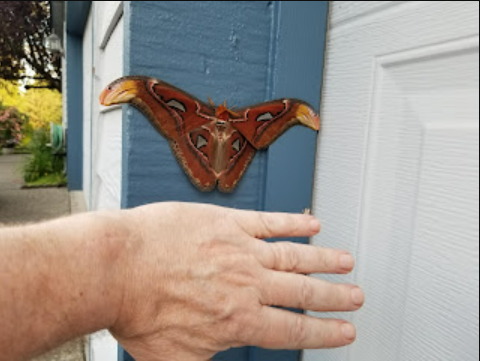One of the world’s largest moths has been found in Washington state
The atlas moth is typically only found in Asia, residing in tropical and forest habitats from India to the Philippines and Indonesia
A moth with a 10-innch wingspan was spotted in Washington state, with officials warning residents to remain on the lookout for any new sightings of the species typically only found in Asia.
The atlas moth, one of the world’s largest of the insects, was found by a man in Bellevue, Washington, earlier this summer when he spotted the uncanny colourful markings of the nearly foot-long wings perched on his garage, the Washington State Department of Agriculture reported.
“This is a ‘gee-whiz’ type of insect because it is so large,” Sven Spichiger, WSDA managing entomologist, said in a statement released by the state agency. “Even if you aren’t on the lookout for insects, this is the type that people get their phones out and take a picture of – they are that striking.”
The agency believes this is the first time the species has touched down in the US, as it’s usually found in tropical and forest habitats spanning across Asia from India all the way east to the Philippines and down into Indonesia.
When the moth was discovered by the Bellevue man, it was first sent to WSDA entomologists via a University of Washington professor on 7 July for further confirmation of the insect’s genetic makeup.

By 27 July, the United States Department of Agriculture (USDA) had confirmed that the specimen was indeed an atlas moth and it was, by their assessment, the first detection of the species in the US.
While the atlas moth does not pose a public health threat to residents, the WSDA is encouraging people to photograph, document and report any suspected sightings of the insect, as the agency is keen to confirm whether the creature is a lone wolf or there is an active population settling in on the west coast.
“This is normally a tropical moth. We are not sure it could survive here,” Mr Spichiger said. The moth is only second in size to the white witch moth, who holds the title with a record 14in wingspan.
“USDA is gathering available scientific and technical information about this moth and will provide response recommendations, but in the meantime, we hope residents will help us learn if this was a one-off escapee or whether there might indeed be a population in the area,” he added.
The WSDA asks that the public send any photographs or suspected sightings of the moths to the agency via email at pestprogram@agr.wa.gov so that experts may be able to process it for identification.
Join our commenting forum
Join thought-provoking conversations, follow other Independent readers and see their replies
Comments


Bookmark popover
Removed from bookmarks